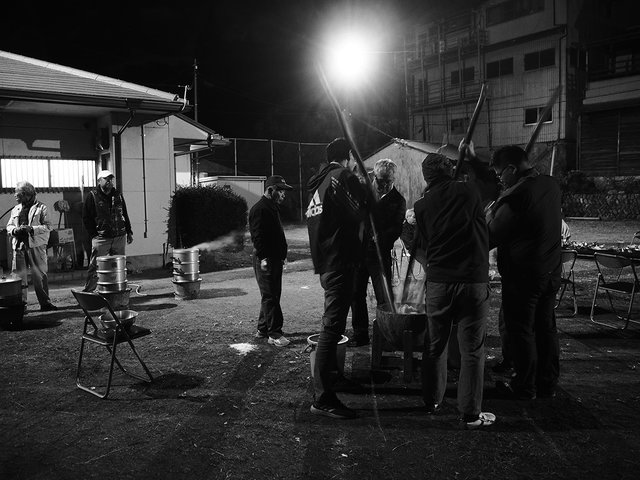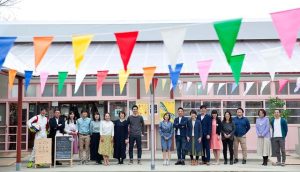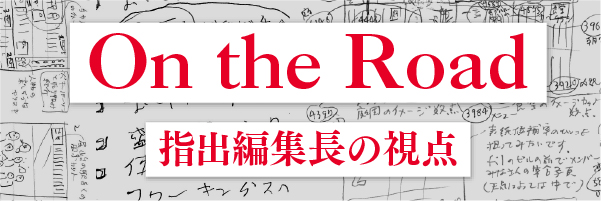土曜日の夕方から、隣の柏木地区へ歩き、公民館までの階段を下りた。錆びたドラム缶の中の炎が暗闇を赤く照らした。柏木の区長は僕を椅子へ案内して、ビールを注いでくださった。「千本搗きは初めて? 昔からこうして、餅つきをしとる」と彼は言い、男性たちを指差した。蒸した餅米はセイロから石臼まで運ばれた。8人の男性は長い杵で石臼にある餅米をどんどんついた。餅が十分軟らかくなったら、公民館の中へ運ばれた。見覚えのある顔が僕に近づいて来た。「エリック、中も見に行ってや」と彼は言った。
公民館の中でエプロンを着た女性たちは作業で忙しかった。一人は餅の大きな塊を何回も切ってから、あとの10人はその餅を手際よく一個ずつに丸めていた。その一個を次々に長い木箱に並べた。みんなの手は小麦粉で白かった。僕は女性の円に入り、自分で餅を丸めてみた。「この一個が明日の柏木運動会で飛ぶのだろう」と考えながら、楽しく丸めた。毎年の運動会は柏木の大事な行事だ。普段柏木に住んでいなくても、わざわざ帰ってくる人はいる。競技の後、待望の「餅撒き」をする。
公民館の外で僕は杵を一本もらい、男性たちと石臼を囲んだ。「ちょっと待って、塩、塩!」と一人は言い、餅米に塩を投げた。「よっしゃー! よっしゃー!」ともう一人は叫び、みんなは勢いよく杵で餅米をついた。メガネが餅米の湯気で曇ったが、僕は杵を振り下ろし続けた。「回せ、回せ!」と一人は叫んだ。餅米がだんだん粘り、米より餅に近いものになった。「もう裏返してよ、おいらは疲れるから」と隣のおじさんは訴えた。担当者は両手で大きな餅の塊を石臼の中で裏返し、水を加えた。みんなは杵を水に浸し、また餅をつき続けた。ずっと同じ動きをしながら、腕がだんだん疲れた。そのうち、「もうええけ?」と一人がみんなに問いかけた。担当者は石臼の餅をよく見てから、「ああ、まだまだ」と言った。「ほんま? もうええやろう」と抗議しながら、みんなは再び杵の作業に戻った。
最後のセイロの餅米をつき、みんなはぼちぼち片付けの作業を始めた。ほかの若手と杵を洗ってから、区長に声をかけていただいた。「エリック、どうぞ、中に上がって」。みんなは公民館の長いテーブルに集まった。男性と女性は部屋の反対側で自然に分かれて座った。数えきれないほどのお餅たちが壁に沿って長い板に並べられた。明日の運動会の前に一息をついて、みんなで乾杯した。
Vol.6 Sticks and a Stone Mortar
Saturday evening, I walked over to the Kashiwagi district and descended the steps down to their community building. The fire in the rusted drum can lit the darkness in red. The community manager directed me to a chair and poured me a beer. “Is this your first time seeing senbonzuki? This is how we’ve pounded mochi since the olden days,” he said, and pointed to the men. The steamed mochi rice was carried from the basket steamer to the stone mortar. Eight men used two-meter-long pestles called kine to pound the mochi rice over and over in the stone mortar. When the mochi was soft enough, it was carried into the community building. A familiar face approached me. “Eric, make sure you see the inside too,” he said.
Inside the community building, women in aprons were busy at work. After one of them chopped up a large chunk of mochi, the other ten women deftly formed those pieces into round bites. They lined up the bites one after another in long wooden boxes. Everyone’s hands were white with flour. I joined the circle of women and tried forming the mochi myself. “This mochi is going to fly at the Kashiwagi Sports Day tomorrow,” I thought to myself, enjoying the work. The annual Sports Day is an important event in Kashiwagi. There are people who do not regularly live in Kashiwagi who make the effort to come back home for it. After the competitions, they hold the much-anticipated “mochi tossing”.
Outside the community building, I was handed a kine and joined the men around the stone mortar. “Hold on, the salt, the salt!” someone said and threw salt into the mochi rice. Another person cried out, “Yossha! Yossha!” and everyone enthusiastically pounded the mochi rice with their kine. My glasses fogged up from the steam of the rice, but I kept at it. “Turn it, turn it!” someone yelled. The mochi rice gradually turned sticky, and began to resemble mochi more so than it did rice. “Flip it over already, I’m getting tired,” pleaded the man next to me. The man in charge flipped the hunk of mochi over in the stone mortar, and added some water to it. We dipped our kine in water and continued pounding. After performing the same movement over and over, my arms gradually tired out. At some point, someone asked the group, “Is it ready?” Taking a close look at the mochi inside the stone mortar, the man in charge said, “Hmm, not quite yet.” Everyone protested, “Really? It looks fine already,” as we got back to work once again.
We pounded the rice from the final basket steamer and started cleaning up little by little. After washing the kine with one of the other young guys, I was called over by the community manager. “Eric, go ahead and join us inside.” Everyone was gathered at the long tables inside the community building. Men and women naturally split up and sat on opposite sides of the room. Countless bites of mochi were lined up on long wooden boards along the wall. We took a short breath before the next day’s Sports Day, and all raised our glasses.


























